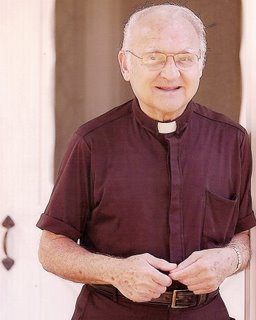 (Sixteenth Sunday of the Year (B): This homily was given on
(Sixteenth Sunday of the Year (B): This homily was given on [For the audio version of this homily, click here: Sixteenth Sunday 2006]
If I look a little bleary-eyed this morning, it’s because I got home quite late last night. It was Saturday evening at the
I go through this routine, as most of you know, every summer.
Why?
Why do I go back and forth to LaSalette Shrine a couple of times on Steubenville weekend in July, in between all my other parish duties (like celebrating 3 Sunday Masses!)? Why do I sit under big, dusty tent under the hot summer sun for long periods of time in the midst of 2,000 noisy, excited teenagers? Why do I listen to their confessions for 2 or more hours at a clip?
Am I insane? Am I a glutton for punishment?
(Perhaps—but that’s another story!)
The truth is I do it because I am a priest. And because I’m a priest, I’m a shepherd—a spiritual shepherd—a shepherd of souls. Consequently, this is what I’m supposed to do! A spiritual shepherd (just like an earthly one) guides and leads his sheep—in this case even his “teenage sheep”. He watches over them, feeds them, disciplines them when necessary, and helps them to navigate through the many dangers that surround them. That is to say, he makes—or at least he should make—every effort to live in imitation of the divine Shepherd of Psalm 23. There the psalmist (who considers himself to be a sheep) writes, “In verdant pastures he [the divine Shepherd] gives me repose; beside restful waters he leads me; he refreshes my soul. He guides me in right paths, for his name’s sake. Even though I walk in the dark valley I fear no evil; for you are at my side with your rod and your staff that give me courage.”
Jesus, as we all know, called himself “the Good Shepherd.” He did that in John 10. But Jesus didn’t just talk about being a shepherd; apparently he also thought about it quite often. That fact can be discerned, I think, from what St. Mark tells us in today’s Gospel reading. There he says that when Jesus saw the vast crowd in front of him “his heart was moved with pity for them, because they were like sheep without a shepherd.” With his bodily eyes Jesus saw human beings in front of him that day (obviously!), but with his mind’s eye he saw “sheep”—sheep who were desperately in need of a shepherd! And so as St. Mark tells us “he began to teach them many things.” Even though Jesus was clearly exhausted from all he’d been doing, he went the extra mile for his sheep that day and taught them the Gospel.
So why shouldn’t I go a few extra miles back and forth to
Not every shepherd, of course, is a good one who tries to live in imitation of the divine Shepherd. In today’s first reading, for example, the Lord berates the religious leaders of his people at the time of Jeremiah. He says, “Woe to the shepherds who mislead and scatter the flock of my pasture . . . you have scattered my sheep and driven them away. You have not cared for them.” (This text, I would say, is a clear warning to those modern-day priests and religious who preach their own ideas from the pulpit, and not the official teaching of the Church.)
Perhaps these bad shepherds who lived at the time of Jeremiah didn’t have good role models to emulate. Maybe that was their problem. After all, doctors learn how to be doctors from other doctors; carpenters learn how to be carpenters from other carpenters; and shepherds learn how to be shepherds from other shepherds. Consequently, it’s extremely important that the “teaching shepherds” be good ones!
Personally, this means that I don’t have any excuses! I don’t have any excuses for being a bad shepherd in my priestly ministry. I say that because I grew up surrounded by many excellent priest role models, one of whom you all know, Fr. Francis J. Giudice. I first met Fr. Giudice back in the early 1960s, when I was 5 and he was about 35. But the man really hasn’t changed in all these years. Even now, in his late-70s, he’s still energetic; he still loves being a priest; he still understands the importance and the power of priestly ministry. Even though he’s “retired,” he helps out in two parishes; he does work as a hospital chaplain a couple of times a week; and he does all kinds of things to raise money for the poor in
Without a doubt, Fr. Giudice has been a good shepherd to many of God’s sheep; but he’s also been an excellent example and role model to many younger shepherds in the Church—including yours’ truly.
To him, the priesthood is not a “job,” any more than being married is a “job”. Although being married may sometimes feel like “work,” it’s much more than that. Marriage is a vocation.
And so is the priesthood.
It’s my prayer to day that the Lord will inspire many more young men (even here in our local community) to become priests in the future. And may he pour forth his blessings upon all those who are already serving him in the priesthood, so that they will take their vocations seriously and always be good shepherds.
Like Fr. Giudice.